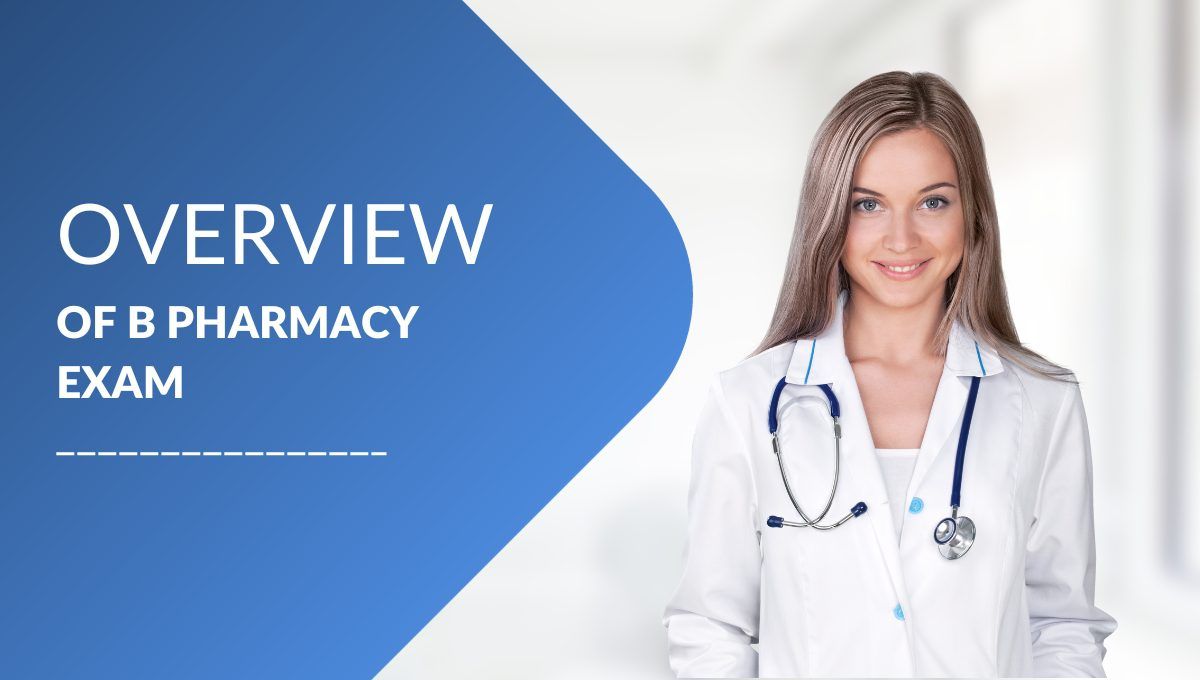Introduction
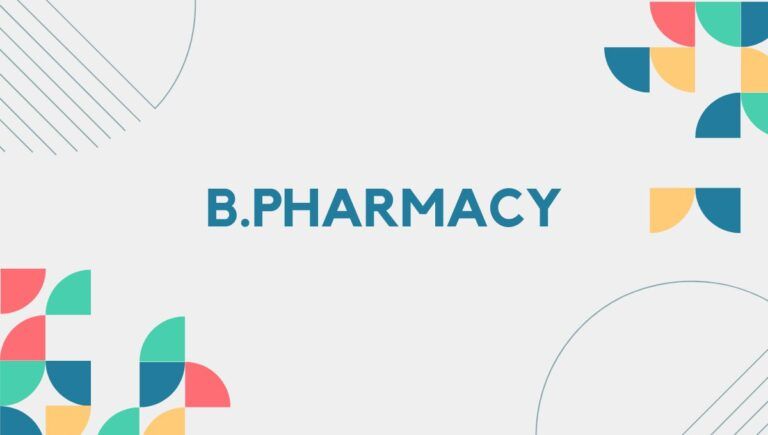
Welcome to our overview of B Pharmacy exams! Here is our complete study guide for the B.S. in Pharmacy degree! If you’re thinking about entering the pharmacy field or are currently enrolled in a B. Pharmacy program, you should know what to expect from these tests. To help you do well on your B. Pharmacy exams, here we will give you a high-level overview as well as insights and practical tips.
The B Pharmacy exams are important to your career as a pharmacist. From pharmacology and chemistry in pharmaceuticals to pharmacognosy and drug delivery, these tests will test your skills related to many angles present in the pharmaceutical industry. With this manual, we’ll show you the ropes and make sure you’re comfortable with every facet of taking these tests.
Everything from whether or not you are eligible to take the exam to its format, its content, and the study materials you should consult will be covered in this tutorial. Preparing for the B Pharmacy exams is not easy, but it is possible with the right information and approach.
Anyone who wants to do better on their exams, from prospective B Pharmacy majors to current students, can benefit from this study guide. You will finish this blog post knowing exactly how the test is organized, where to look for helpful study materials, and how to do your best result on the test which leads to your dream.
So, let’s go through the world of B Pharmacy exams and get ourselves set up for success in our careers!
If you are still confused whether you should do B-pharmacy or not , then check out our blog: Is B-Pharmacy A Good Career
B Pharmacy Eligibility
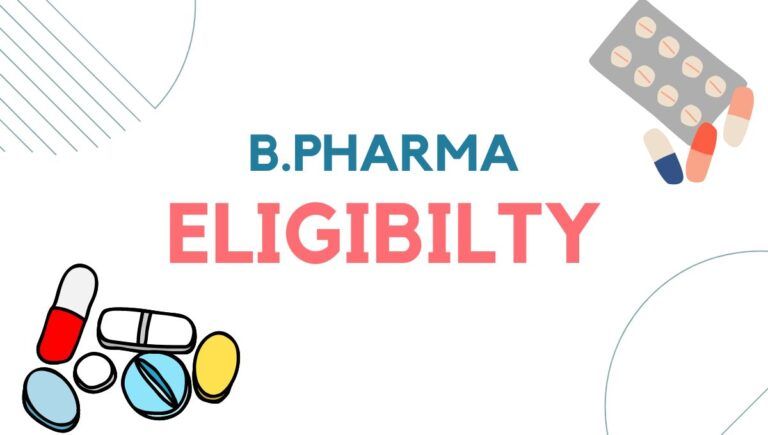
Understanding the requirements for these tests is crucial before beginning your quest to obtain a B Pharmacy. These are the main factors to think about:
- Academic Requirements: You normally need to have finished your higher secondary education (10+2) or its equivalent with a science background in order to be eligible for B Pharmacy exams.
- Age Restrictions: The relevant educational institutions or examination bodies may have established age restrictions. It’s critical to review the age requirements and confirm that you are of legal age to take the B Pharmacy exams.
- Criteria for Nationality: B Particularly if you’re registering for entrance examinations in a certain nation, pharmacy exams may have specific nationality criteria.
- Entrance Exams: Universities or schools that offer B Pharmacy degrees occasionally have entrance exams to choose students.
- Minimum Percentage: Some institutions may set minimum percentage standards for board exams like the 10+2 or equivalent qualifying exams. Make sure you achieve the minimum percentage requirements set by the schools you desire to apply to.
B Pharmacy Exam
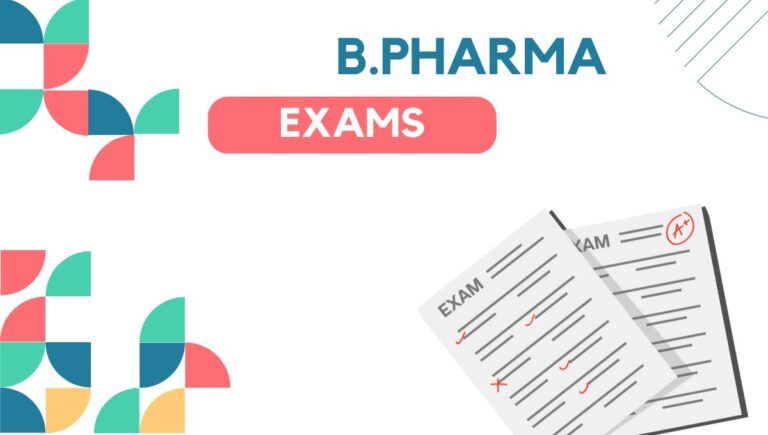
The path to becoming a licensed pharmacist includes passing the B Pharmacy examinations. With regard to knowledge, comprehension, and performance, these tests provide a thorough assessment of a student’s abilities in a range of pharmaceutical domains. They are crucial in ensuring that desire to become pharmacists must have the skills and information necessary to thrive in their field.
Each portion of B Pharmacy exams normally focuses on a distinct topic, such as pharmaceutical chemistry, pharmaceutical law, pharmaceutical analysis, pharmaceutical pharmacology, and pharmaceutical pharmacognosy.
Exams for the B Pharmacy demand thorough study and well-thought-out preparation. Students are urged to fully comprehend the exam format, curriculum, and scoring system. They must cover a wide range of subjects, including pharmaceutical legislation and regulations as well as medication classification and formulation.
Students frequently use a variety of study tools, such as textbooks, reference books, online resources, and practice exams, to ace their B Pharmacy exams. Making a study regimen, using example papers, and asking instructors and mentors for advice can all greatly improve preparation efforts.
A successful job in the pharmaceutical business is accessible after passing the B Pharmacy exams. It enables people to pursue a variety of opportunities, including careers in pharmaceutical research, medication development, hospital or retail pharmacy work, and regulatory affairs.
In conclusion, the B Pharmacy tests are thorough evaluations of candidates’ knowledge and abilities. Exam preparation that is time and effort-intensive increases the likelihood of passing and launching lucrative jobs in the pharmaceutical sector.
B Pharmacy Syllabus
|
Semester |
Subjects |
| I | Human Anatomy & Physiology I, Pharmaceutical Chemistry I, Pharmaceutics I, Pharmacognosy I, Biochemistry I |
| II | Human Anatomy & Physiology II, Pharmaceutical Chemistry II, Pharmaceutics II, Pharmacognosy II, Biochemistry II |
| III | Physical Pharmacy, Pharmaceutical Microbiology, Pharmacology I, Pharmaceutics III, Pathophysiology |
| IV | Pharmaceutical Engineering, Pharmaceutical Analysis I, Pharmacology II, Pharmaceutics IV, Computer Applications in Pharmacy |
| V | Pharmaceutical Analysis II, Pharmaceutical Management & Marketing, Pharmacology III, Pharmaceutics V, Indian Pharmacopoeia & Drug Regulatory Affairs |
| VI | Industrial Pharmacy I, Novel Drug Delivery Systems, Pharmacology IV, Pharmaceutics VI, Pharmacy Practice |
| VII | Pharmaceutical Biotechnology, Pharmaceutical Quality Assurance, Pharmacology V, Pharmaceutics VII, Clinical Pharmacy |
| VIII | Pharmaceutical Jurisprudence, Pharmaceutical Marketing Management, Pharmacology VI, Pharmaceutics VIII, Project Work/Elective |
B Pharmacy Study Material
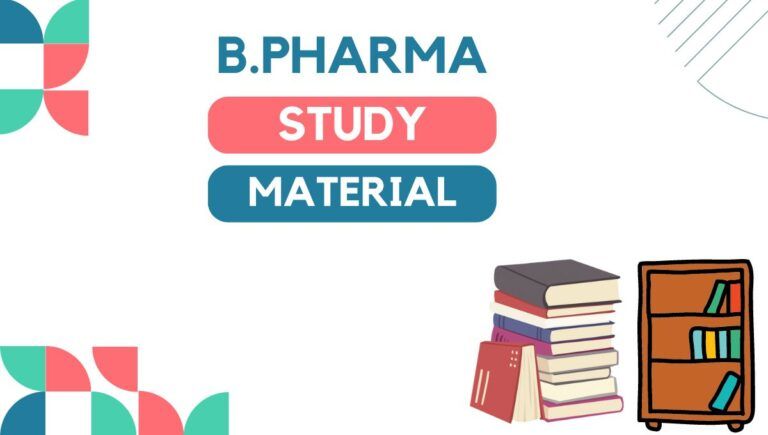
It’s essential to have access to dependable and thorough study materials if you want to succeed on your B Pharmacy tests. The following are some crucial readings and sources for B-pharmacy students:
Textbooks: Recommendations for textbooks written by well-known authors thoroughly cover the whole curriculum. A few well-liked texts for B Pharmacy are “Remington: The Science and Practice of Pharmacy,” “Martindale: The Complete Drug Reference,” and “Pharmacology for Pharmacy Technicians.”
Reference books: Reference books offer brief explanations, important details, and practice questions. They make practical companions for quick review and reinforcement of crucial subjects.
Online Resources: Numerous websites and online platforms include interactive quizzes, study guides, lecture notes, and video tutorials. Pharmaceutical sciences courses can be accessed for free or for a fee on websites like Khan Academy, Coursera, and OpenLearn.
Journals & Research Papers: Students can keep up with the most recent developments and research in the field of pharmacy by reading academic journals and research papers.
Practice Papers and Mock Examinations: Students can become more comfortable with the exam format and gain confidence by completing practice papers and taking mock examinations. For B Pharmacy exams, many publishers offer specialized books with past exam questions and practice tests.
It’s critical to pick study resources that adhere to the program’s unique syllabus and standards. Students can improve their understanding, memory, and application of pharmaceutical ideas and succeed in the B Pharmacy exams by making appropriate use of these study materials and resources.
B Pharmacy Course
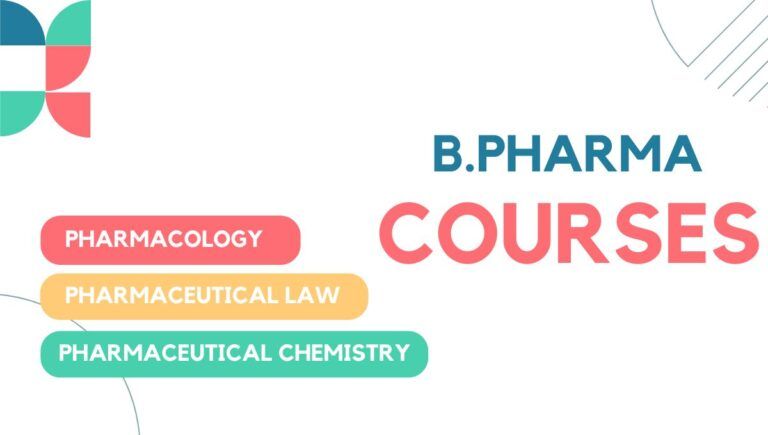
A wide range of courses pertaining to pharmaceutical sciences are included in the Bachelor of Pharmacy (B Pharmacy) program’s extensive curriculum. The following are some sample courses that B pharmacy schools often offer:
- Pharmaceutical Chemistry: The study of inorganic and organic chemistry as it relates to pharmaceutical sciences is the main topic of this course. It addresses subjects including medicinal chemistry, drug production, analysis, and design.
- Pharmacology: Pharmacology investigates how medications affect the body. It investigates how different medications work, their pharmacokinetics, pharmacodynamics, and therapeutic uses. The creation, formulation, and production of pharmaceutical dosage forms are all covered in this course on pharmaceutics. It covers things like pharmaceutical packaging, drug delivery systems, and technology.
- Pharmaceutical Analysis: This course focuses on the analytical methods used in medication analysis and pharmaceutical quality control. It includes both traditional and instrumental analytical techniques.
- Pharmaceutical Law: The legal and moral facets of pharmacy practice are covered under pharmaceutical law. It covers things like pharmacy legislation, rules for drugs and cosmetics, and intellectual property rights.
The main curriculum of B Pharmacy programs consists of these courses as well as other specialist topics. Students who successfully complete these courses have a thorough understanding of pharmaceutical sciences, putting them in a position to pursue careers in the pharmaceutical sector or additional education in the area.
Jobs After B Pharmacy
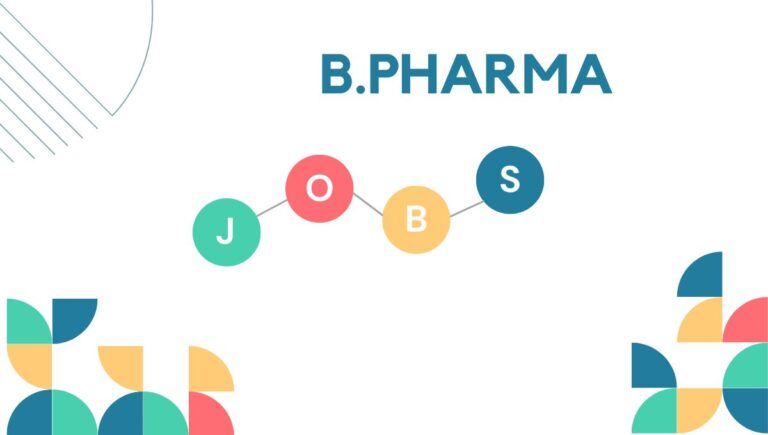
Graduates with a B.S. in pharmacy degree have numerous employment options in the pharmaceutical and healthcare industries. Following are some salient characteristics about careers in pharmacy after earning a B.
- Pharmacist: Graduates with this profession can find employment in retail pharmacies, medical facilities, or clinics.
- Pharmaceutical Industry: B-Pharm graduates can work in the pharmaceutical industry as research associates, medical writers, regulatory affairs professionals, and pharmaceutical sales representatives, among other positions.
- Pharmaceutical Research: R&D departments of pharmaceutical corporations or research organizations offer opportunities. Formulation development, clinical research, and medication safety monitoring are examples of possible job duties.
- Government Positions: Public health departments, drug regulatory agencies, and government healthcare organizations are all potential job paths for pharmacy graduates.
- Academic and Teaching Positions: Graduates have the option of working as professors at universities and colleges of pharmacy. Salaries for academic employment vary depending on the institution of higher learning, amount of experience, and academic accomplishments.
It’s crucial to remember that earnings might vary widely depending on things including geography, previous employment history, and other certifications. The numbers listed below are approximations that may change in various locations or nations.
Conclusion
In conclusion, this thorough analysis of the B Pharmacy exams has given readers insightful information about earning a B Pharmacy degree. We discussed the significance of qualifying requirements, exam planning, and career options. You can increase your chances of passing these tests by being aware of the requirements and successfully preparing.
To succeed, one must thoroughly prepare by using study tools like textbooks, reference books, online tools, and practice papers.
With a B Pharmacy degree under your belt, you can embark on a variety of professional routes, such as becoming a pharmacist, looking into job opportunities in the pharmaceutical sector, conducting pharmaceutical research, or looking into teaching roles. Based on variables including location, experience, and work function, earnings in various industries can change.
Overall, you can succeed in the B Pharmacy exams and start a fulfilling career in the dynamic and important field of pharmacy with commitment, perseverance, and a passion for pharmaceutical sciences.
FAQ's
What is the history of pharmacy?
Pharmacy actually has a long history of being separate from medicine. The separation happened way back in 1240 AD!
What was the first pharmacy hospital in the world?
The very first hospital pharmacy in America opened its doors in 1752,Philadelphia Hospital.This shows how important pharmacists have been throughout American history.
Was Coca-Cola invented by an pharmacist?
Believe it or not, Coca-Cola was invented by a pharmacist! John Pemberton, a pharmacist from Atlanta, Georgia, devised the formula for the popular drink in 1886.
